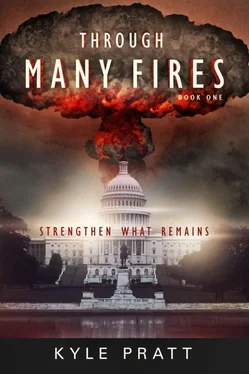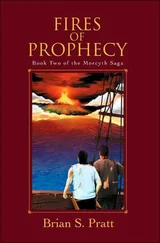Murmurs of disapproval swept the room. “We got the short straw on that one,” a man to the left of Caden muttered.
“And finally, until we have put these terrorist attacks behind us and our economy is back on its feet I am postponing presidential elections.”
A collective gasp swept the room.
The president doesn’t have the right or power to postpone the election. Caden struggled to hear Durant over the debate that now flooded the auditorium.
“We should not, we must not…liberty must temporarily bow…greater good…security…food…back on the job…We will rise from…Thank you and God Bless America.” The screen went dark.
Immediately people on both sides and across the table asked Governor Monroe, “Are you going to drop out of the race?”
Monroe sat silent for a moment as if taking it all in. Then he slowly shook his head. “No. While I believe…I know, that President Durant does not have the authority to postpone the election, he remains the lawful president at least until the next inauguration. Until that time I will cooperate with him in every way that I can, within the Constitution. However, I intend to remain a candidate and speak out on issues where I believe the President is wrong, such as his attempt to postpone the upcoming election and allow Chinese troops into the country.”
The Governor then called for reports from advisors, cabinet officials, FEMA and area Guard commanders. While Monroe was the hub of discussion, a variety of smaller groups formed around the room. David Weston seemed in constant motion bringing people to the Governor, or getting some fact or figure for him.
As the Governor spoke with various advisors, Caden overheard long discussions about flu and other illnesses. He checked his list. No request for flu vaccine. Briefly he considered adding it, but the list was already long. Why add things no one asked for?
It was well over an hour before the Governor met with Adjutant General Lowell. They spoke briefly before David Weston called over one of the Guard commanders. Finally, the Chief of Staff called Caden to meet with the Governor and General Lowell.
The General introduced himself and then asked about troop levels and supplies.
“I have 53 soldiers, which is just over half strength. That number is adequate for the moment. However, I need to be resupplied with ammo.” He handed the general a list.
Caden then laid a map of the Hansen area on the table and described his plan. “We’ll secure the state highway out to the interstate and the North Road toward Tacoma. Also there is a coal power plant here,” he pointed, “I want to try and get it back up and running, but as we expand our area of control I’ll be stretching my manpower and thinning my positions.”
Monroe traced his finger along the North Road. “Opening this route would help move supplies and people. Also we could use the power from the coal generator. The eastern half of the state is good, but on this side of the mountains we don’t have enough electricity because of damaged or destroyed transmission lines. Can you absorb the people from the refugee camp into your community?”
“No, we’re critically short of food and other necessities.” He handed the governor his list. “But if I had enough gasoline and some food I think I’d be able to get most them to the FEMA camp here,” he pointed on the map, “or home if they still have one.”
Monroe nodded. “Everyone has been handing me long lists like you have, but I’ll ask Weston to speak with FEMA and gather what they can.
The sun dipped low in the winter sky as Caden’s SUV pulled onto the freeway behind the Humvee and leading three supply trucks and a fuel tanker. The vehicles were full to the point that some ammo and medicine was stacked in the back of his SUV, still the convoy had less than half the supplies he requested. Caden told the young soldier with him to drive and he sat in the passenger seat with an M4 leaning between his legs. He was exhausted, but all he had done today was listen and talk. He struggled to stay awake while formulating a plan to use his limited supplies to clear the refugee camp and feed the town. It will be good to get home tonight.
Bang!
Caden jerked his head about. What? A blown tire?
The driver cursed loudly.
The car skidded to a stop slamming Caden into the belt.
Throwing the car into reverse the driver weaved the car backward.
Muzzles flashed.
Caden rolled the window down and returned fire.
The Humvee pull back to the curve, stopped across both lanes, and the soldiers jumped out and returned fire.
Glancing quickly to his side he realized they were at the off ramp to Hansen. “Pull in there,” he ordered. The other three trucks followed them into the empty parking lot. Everyone was out of their vehicle in a second.
Caden tossed the M4 to the young soldier and pulled his pistol from the holster. “You guys,” he said pointing to the men from the trucks, “stay here and guard the supplies.” With the soldier from his car he moved forward into the forest. “Radio the others and tell them we are on the right flank in the woods.”
The young man nodded and reported in with the others at the Humvee.
Minutes later Caden was just off to the side of the makeshift roadblock. “Have the men hold their fire.”
When the shooting stopped, Caden crawled up to the barricade. There was blood, but no bandits.
Turning to the man with him he said, “Tell everyone we’ve secured the blockade. Have them clear it from the road and secure the perimeter. Also tell them I’m heading back that way. I don’t want to get shot.”
Caden jogged along the highway to the lot. Throwing up the back hatch of the car, he pulled ammo boxes toward him grabbed several magazines and reloaded others. Out of the corner of his eye he glimpsed two of his soldiers escorting a civilian. “Are you guys okay?” he asked without turning.
“Yes sir. The shooters appear to have run off. The only one we captured is this old guy.”
Caden turned and locked eyes on a grey-haired man that, weeks earlier, would have been dismissed as a bum.
The old man’s eyes widened. “Son?”
“Dad?”
The face was gaunt, the beard scraggly. Disheveled grey hair topped his head and he wore a heavy tan jacket that needed a wash. But under the dirty hair and grime Caden could see the face of his father, Trevor Westmore.
The older man stepped forward and embraced his son. “I’ve been worried about you ever since that first horrible day.”
Caden hugged his father. “I was worried about you too, Dad.”
“I thought… I, well… you’re alive, thank God.”
Stepping back from his father, Caden asked, “What are you doing here? I expected you to be somewhere along the North Road. You didn’t shoot at us did you?”
“No! Well, not exactly. I was up on the hill there,” he said pointing, “watching the guys at the blockade from behind. I had only been there a few minutes when I heard the sound of trucks coming. I was certain they would ambush whoever came down the road. When the lead Humvee rounded the bend I knew I had to act and fired my shotgun. At that range I was sure it wouldn’t hurt anyone, but that you would hear it and probably see the muzzle flash. By-the-way, when did you go back in the Army?”
“I’ll tell you all about it later, but right now I need more answers, like did you find Peter and Susan?”
Suddenly his father looked much older. “I never found Peter, but I did find Sue. She is in a backroom of the church,” he said with a nod toward the building across the street. “I left her there while I checked out the blockade.”
Читать дальше












